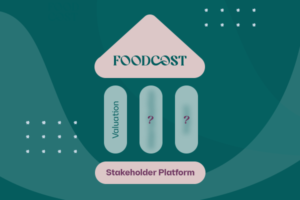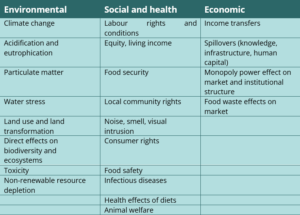The FOODCoST Valuation Pillar
17 Oct. 2023
In the Valuation Pillar of the FOODCoST project, the main goal is to develop a harmonised methodology for the calculation of the externalities of food production and consumption, a database of externality data, and a FOODCoST Valuation Guide to calculate external costs and benefits. Find out how we are working to achieve these goals in this article!

Societal impacts from food production and consumption are multifaceted and widespread: from climate change to biodiversity loss, from human health effects to animal welfare, and from poverty to forced labour.
In order to reduce the negative impacts through True Cost Accounting (TCA) methodologies and internalisation, we need to understand and quantify their actual (marginal) effects and be able to put a value on them. Further, we need to know the costs of abatement of these impacts: what does it cost to reduce the externalities to an acceptable level?
In order to achieve this, we need well-understood measures of the magnitude of the external effects and of the actual costs that each externality represents, or the benefits that they bring to society. The basis for calculating these costs and benefits is scientifically sound and supported by all stakeholders of the FOODCoST project.
What we are doing
Over one year into the project, several tasks have been completed, and the groundwork for the valuation of externalities has been set.
Firstly, a preliminary list of externalities that are most relevant to the food domain has been developed (Table 1). Each impact category describes a set of external effects from food production or consumption. For example, when taking into account an environmental externality such as climate change, we must include a number of emissions that impact the climate, while labour rights and conditions also include various aspects such as child and forced labour, and occupational health and safety.
For each of these externalities, the project team has identified the impact pathways and existing methodologies to measure or estimate their effects and valuation methods. Special attention has been given to acidification and eutrophication, particulate matter, water stress, land use and land transformation, biodiversity, health effects of diets and some of the economic externalities.
Other specific issues will also be developed further in the project, such as the valuation of biodiversity, land use, healthy diets, and the spatial and temporal detail of effects of nitrogen emissions and particulate matter from agriculture. In the next year, the methodologies of the remaining externalities will be assessed. Together, they will lead to a proposal for a harmonised methodology.

Table 1 Preliminary list of externalities
Additionally, data sources for the calculation of effects and valuation have been listed. An inventory of databases (Life Cycle Assessment Data, prices, damage costs, abatement costs) will be created and an assessment of their usefulness and limitations will also be conducted. The EU-global database of external costs that the project will develop consists of new project data as well as references to existing data sources.
Finally, the results of the work conducted within the Valuation Pillar will be incorporated into the FOODCoST Valuation Guide and a roadmap for future research and innovation will be created.
The importance of the Valuation Pillar
FOODCoST aims to contribute to the internalisation of externalities in the food system, through the inclusion of currently uncompensated costs and benefits in the decisions of market actors. This can be done through both public or private interventions, with the effect of decreasing the difference between private and social costs and benefits.
The work in the FOODCoST Valuation pillar will mainly be conducted by partners Wageningen Research, Technische Hochschule Nürnberg, the University of Oxford, RIVM, Sustainable AG, and Universität Bonn. Each of the partners is involved in all the tasks in this pillar, although some focus on specific subtasks or themes, according to their expertise.
